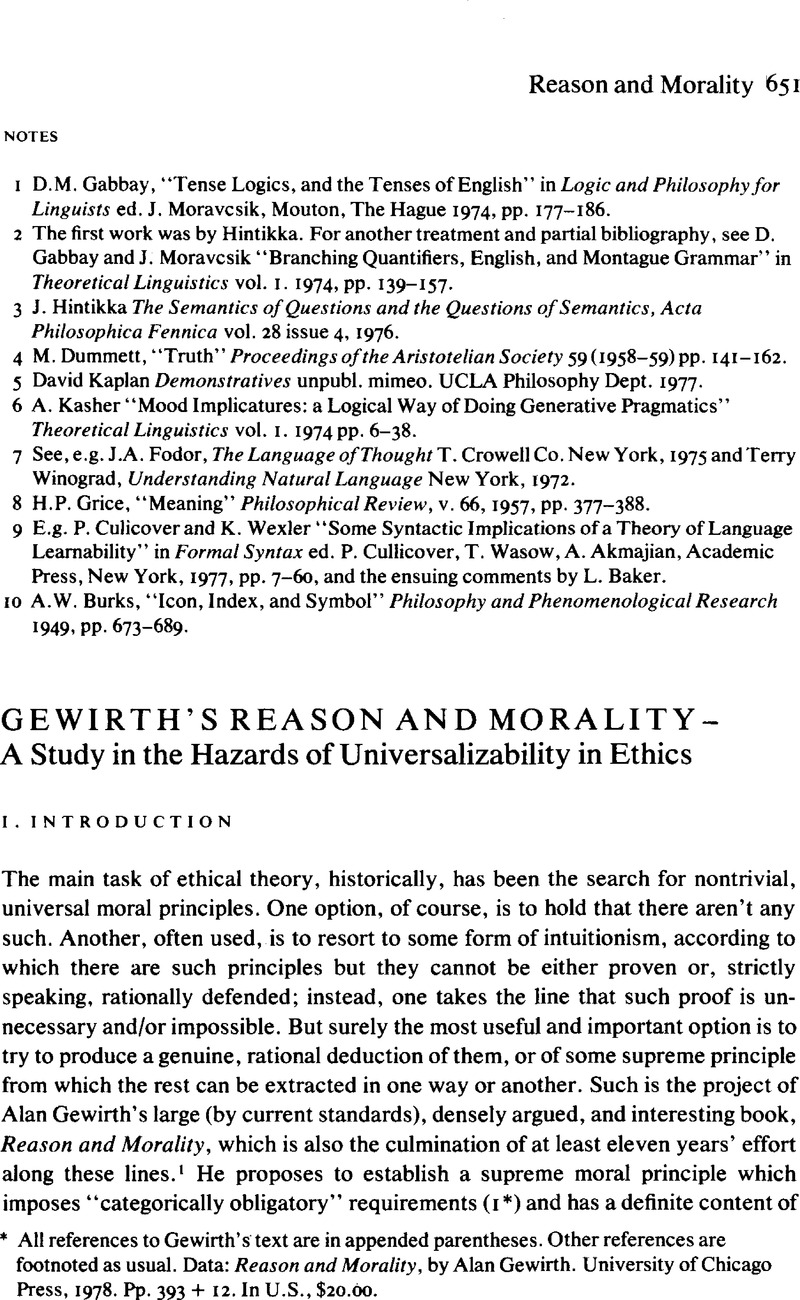Published online by Cambridge University Press: 05 May 2010

1 On p. 367, Gewirth lists his many previous published articles setting forth one or another version or facet of the arguments in the book. The first is in Philosophical Quarterly, 1967, “Categorial Consistency in Ethics”.
2 Sidgwick, H., The Methods of Ethics (Macmillan, London: Seventh Edition), p. 209. Compare also other formulations on p. 379 et seq,Google Scholar
3 This is rather well explained by Gewirth, pp. 104–6, e.g.
4 Narveson, Jan, Morality and Utility (Johns Hopkins, 1967), p. 277.Google Scholar
5 Cf. Nagel, Thomas, The Possibility of Altruism (Oxford, 1970)Google Scholar, especially Chs. VI–VIII.
6 The point is very clearly stated in both the Foundations of the Metaphysics of Morals and the Critique of Practical Reason. In the latter, for instance, we have: “To be happy is necessarily the desire of every rational but finite being” (24); “Now a rational being's consciousness of the agreeableness of life which without interruption accompanies his whole existence is happiness …” (20); “The only thing he considers in making a choice is how great, how long-lasting, how easily obtained, and how often repeated this agreeableness is.” (22); etc. (Page numbers are in the Bobbs-Merrill, Liberal Arts Press edition, translated by Lewis White Beck, 1956.) All this is purest Bentham; even the ambiguities are the same. Those who overlook this no doubt are confusing prudential rationality, which is in question here, with moral rationality, which Kant takes to be a quite independent motive and whose principle he takes to be quite capable of overriding prudential rationality altogether.
7 Thus Sidgwick, op. cit.: having laid down the Axiom of Justice, as in note 2 above; and the axiom of Prudence, corresponding to Kant's second type of Imperative, he says “I obtain the self-evident principle that the good of any individual is of no more importance … than the good of any othe” (382).“Accordingly, I find that I arrive, in my search for really clear and certain ethical intuitions, at the fundamental principle of Utilitarianism” (387). In my own effort (cf. note 4), I infer the same sort of thing from the same sort of premisses, though claiming, like Gewirthand, say, R.M. Hare, that the universalizability principle is “analytic”. Thus “What follows from all this is, of course, that if my (or anyone's) interests are going to be advanced as ultimately supporting evaluations, then everyone's interests to the same. But this is all that we need, for it is precisely what utilitarianism asserts …” (275).
8 Cf., for instance, “Reason and Maximization”, Canadian Journal of Philosophy, March 1975–
9 Cf. the present writer's critical notice, “Animal Rights”, in Canadian Journal of Philosophy, March 1977.
10 Cf. Morality and Utility, ch. III.
11 Gauthier, op. cit., note 8.
12 Mill, On Liberty - 6th-last paragraph of Ch. I.